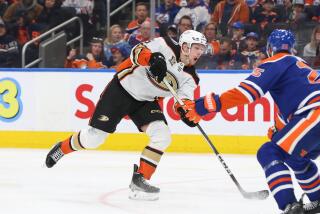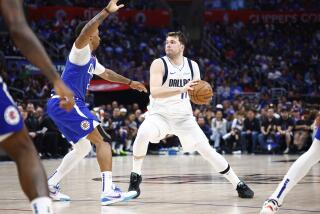NHL Adds Muscle to Earn Respect : Hockey: Expansion franchises in Anaheim and Miami hold promise of being a shot in the arm for league’s image.
- Share via
When the NFL expanded to Tampa Bay in 1976, there was no talk of the Buccaneers helping the league secure a better network television contract.
When Major League Baseball expanded to Seattle in 1977, no one marveled at how the Mariners would strengthen baseball ownership and improve the sport’s credibility.
And when the NBA expanded to Minnesota in 1989, league marketing directors didn’t look for the Timberwolves to set an example they all could follow.
But Anaheim and Miami bring franchises to the National Hockey League this winter, and they’re hailed as saviors of the league, clubs expected to raise the NHL’s prominence among its professional sports brethren.
Is the NHL in that bad a shape?
Definitely not, but if the league is to fulfill its ambitious plans of becoming one of this nation’s--and the world’s--most popular leagues, on a par with the NFL, NBA and Major League Baseball, it can use some help.
And league executives believe the Walt Disney Co., which owns the Anaheim franchise, and Wayne Huizenga’s Blockbuster Entertainment Corp., which owns the Miami franchise, can definitely help.
Both are entertainment industry giants--Disney a $7.5-billion conglomerate with major amusement parks in Anaheim, Orlando, Paris and Tokyo, and major holdings in the movie, publishing and retail industries; Blockbuster the world’s largest distributor of home video rentals and sales with some 2,900 stores in the United States and nine foreign countries.
Both, but especially Disney, are noted for their marketing strengths, and they’ll place teams in two of the nation’s largest television markets--Orange County is part of the Los Angeles market, the second-biggest; Miami is ranked 16th.
Both are expected to bring stability and strength to a league that has had some weak ownership, and several league executives say they could help the NHL reap enormous benefits down the road.
“We now have a partner (Disney) that none of the other leagues have, and it has been a while since the NHL attracted a business the other leagues would like to have and don’t,” said Pat Forciea, vice president of communications of the Minnesota North Stars.
“There hasn’t been an entity like Disney that in one fell swoop moves all of us up the ladder. I think we’re on the way toward becoming the well-respected North American business we want to be.”
Usually when leagues expand, the primary focus is on the impact the new team will have on the city or region it plays in.
But although the Orange County and Miami economies will certainly benefit, there has probably been more attention paid to the impact these clubs--and owners--will have on the NHL.
The reason is simple: The NHL, long considered inferior to pro football, basketball and baseball, is in dire need of some impact owners who can help elevate hockey’s popularity from a regional to a national/international level. And perhaps no two corporations can have more impact in this area at this time.
It’s symbiosis at its best.
“There’s no question we’re a league in need of having our profile raised,” Forciea said. “But if you gave owners the chance to hand-pick business to bring to the league, could you do better than Disney or Blockbuster? I don’t think so.”
There’s a Disney Store in Minneapolis’ Mall of America, but by this time next year, the home of Mickey Mouse sweat shirts and Beauty and the Beast serving sets might have an expanded inventory.
“I would guess there’ll be all sorts of NHL memorabilia in that store,” Forciea said. “That’s one of the busiest stores in the mall, and the prospect of having thousands of kids walk by it every day, makes an impression.
“For the most part, people are exposed to the North Stars in a limited number of ways. We need more opportunities to have people bump into us when they weren’t expecting to.”
Disney and Blockbuster will likely place a marketing bodycheck on the American public, bombarding it with hockey-related messages and merchandise, and league executives get excited just thinking about:
--NHL merchandise, such as hats, shirts and jackets, sold in all Disney stores and NHL booths at each of the Disney theme parks.
--Action-packed ads promoting the NHL on every Blockbuster video rental, and NHL posters along the walls of Blockbuster stores across the country.
--Movie-like trailers at Disney films in theaters throughout the world promoting the local NHL team, that country’s NHL stars or the NHL in general.
And on the wilder side:
--You’ve heard of Toontown? Disneyland could add a hockey-themed land called Goontown, where the main attractions would be Smash Mountain, Splatterhorn and It’s a Jungle Out There Cruise.
--Mighty Duck Pate on a Croissant--it could be the rage on the menu at Paris’ Euro Disney.
--Blockbuster contests, in which fans can don skates between periods of NHL games and bodyslam life-sized, stuffed hockey players. Best check wins free video rentals and popcorn for a month.
The possibilities are endless.
“You have two outstanding owners who are marketing whizzes, and I think they’ll do a great job,” said Richard Gordon, managing general partner of the Hartford Whalers. “We’re bringing in brainpower--they sure know how to do it.
“We’ve been behind the times, and we want to get on the other side of the curb. Not just in U.S. marketing but worldwide. There are major populations in Europe and Asia. Disney is located in France and Japan, and Blockbuster is global, too. Having them in the league benefits everyone, them and the league. It’s a win-win (situation).”
Steve Ryan, president and chief executive officer of NHL Enterprises, the marketing arm of the NHL, has already had talks with Disney marketing people about a broad range of ideas in which the league and the company could cooperate.
“You look at the businesses they’re in--entertainment, publishing, retail, licensing--they parallel the business of NHL Enterprises,” Ryan said. “The Disney magic is unique in the business world, and they understand in great detail the marketing process. They’re going to bring that knowledge to the league, and that will help us.”
Added David Poile, general manager of the Washington Capitals: “There’s an anticipation that some of their ideas and successes will rub off on the NHL. Disney and Blockbuster represent a lot of marketing and imaging situations the NHL would like to imitate.”
Image, especially in the United States, hasn’t exactly been a strength for the NHL. Former league President John Ziegler, who resigned last spring, was never perceived as a dynamic leader when compared to other sports’ commissioners--he was the one who proclaimed that a U.S. national television contract was not important to the league.
The league left ESPN in 1988 for a deal with SportsChannel America, which promised more money but not necessarily more viewers. It proved to be a fiasco because many customers refused to pay extra for the premium channel, and many cable companies didn’t even offer it. The NHL returned to ESPN this season and is in the first year of a five-year, $16-million contract.
The NHL also has had a hard time attracting solid local ownership in the United States. Franchise sale rumors have persisted in Hartford, Minnesota, New Jersey, St. Louis and even Pittsburgh, where the Penguins have won the last two Stanley Cups.
The Kansas City Scouts, who entered the league in 1974, moved to Colorado in 1976 and New Jersey in 1982. After entering the league in 1967, the California Golden Seals moved to Cleveland in 1976 and merged with the North Stars in 1978. Both franchises were plagued by owners with shallow pockets and narrow vision.
When Ottawa and Tampa Bay joined the league this past year, the NHL basically had to hold their hands through the expansion process, extending deadlines for franchise fees, because they were short on cash, and relaxing season-ticket requirements for Tampa Bay. Neither had an arena in the construction phases when they were admitted to the league.
Then along came Disney and Blockbuster, both of which should have no problem making the $50-million franchise-fee payments and securing commitments to sell 10,000 season tickets.
Construction workers are putting the finishing touches on Anaheim Arena, which will serve as home for the team once a lease is secured. Miami will at first share an arena with the NBA’s Heat but is considering building a home rink.
NHL executives believe that the mere size and financial strength of Disney and Blockbuster--and the fact that these companies sought a link with the NHL--should bring more credibility to the league.
“It’s no secret both Miami and Anaheim have stronger ownership than Tampa Bay and Ottawa,” said Jimmy Devellano, senior vice president of the Detroit Red Wings. “They’re solid, reliable people in big markets. That type of ownership is exciting.”
Although league officials are glad to be back with ESPN, $16 million is pocket change compared to the kind of money football, basketball and baseball leagues receive for their network television rights.
League executives are hoping to build momentum through the course of the ESPN contract so that, after five years, they’ll be in a better position to secure a more lucrative deal with ABC, CBS or NBC.
“The future of the game, in terms of broadcasting, is significantly enhanced by having Disney and Blockbuster as partners,” Ryan said. “When organizations like these invest in the NHL, the stock of our league soars in the minds of consumers.”
The NHL also hopes to expand that base of consumers. Several of the league’s stars are from Eastern Europe, and some European countries televise an NHL game each week. The league is making a merchandising push into Europe and Asia, and Disney and Blockbuster will give the NHL inroads into those markets.
“As competitive as we are on the ice, we have to work hard for uniformity in reference to marketing, exposure and identity of the game,” said Lou Lamoriello, president and general manager of the New Jersey Devils. “This is critical if we want to get out of this regionalization of the sport.
“A lot has happened in hockey--even minor league teams are attracting great crowds. This is an opportune time, and these two teams coming in only enhances our situation. What it says to the world is these two companies, who touch a lot of people throughout the U.S., Europe and Asia, feel strongly about hockey. These are all intangibles that will have an effect.”
More to Read
Go beyond the scoreboard
Get the latest on L.A.'s teams in the daily Sports Report newsletter.
You may occasionally receive promotional content from the Los Angeles Times.







